- Home
- Anne Lamott
Rosie Page 2
Rosie Read online
Page 2
“Same old world it’s always been, beautiful and cruel.”
“No, it’s much worse; it hovers on the brink of destruction.”
“Elizabeth. Living on earth has always been a dangerous way to spend your time. Before the Bomb there were Huns, plagues, beasts. There has always been war; mothers have always worried. Mothers used to have to worry about polio, and before that, chariot accidents, and before that ... you’ve just got to have faith.”
“But I don’t.”
“But I have a lot.”
“What if it’s retarded? What if it grows up and kills people? What if—what if it’s as neurotic as I am?”
“You’re my favorite person in the world.”
“I’m an insomniac. I’m prone to depression. I probably drink too much. I’m too scared to have a baby right now.”
But she reconsidered. She had nothing to show for thirty years except an increasing amount of knowledge not yet applied to anything and a great garden. A child would give her something to do with her time; she was watching the clock too much. It would give her a sense of purpose, relatedness, an excuse not to have to come up with something to do with her life; maybe it would give her that elusive and craved carrot, peace of mind.
Oh, what the hell.
“What shall we name it?” Andrew asked, holding her.
“Demo,” she said.
They named their baby girl Rosie and watched her grow. Elizabeth loved the first two years: her days were full, her nights were full, and nursing was the purest, simplest communication she had ever known. Rosie was quiet, content, funny, and responsive, a bright little animal who considered Elizabeth to be the most wonderful thing in the universe. Elizabeth marveled that she had given birth to such a creature, and Andrew, changing diapers or rocking her to sleep at dawn, had never been so happy. Elizabeth smoked less, drank less, smiled more often, and only rarely felt like throwing the tiny body at a wall.
Rosie cried very little and had eyes as blue as Andrew’s, eyes as blue as a Siamese cat’s, and soft black curls. She was tiny, too thin perhaps, but had an already beautiful triangular face.
One sunny day Elizabeth was planting sweet williams, with Rosie beside her in a red sunsuit, playing with a trowel, both of them peaceful and in their own worlds, when Rosie suddenly flung a handful of dirt into her mother’s face. Elizabeth yelped, eyes stinging and wet, grabbed her daughter’s hand, and slapped it, hard. Rosie lost her balance and fell face down into the dirt, bawling until her terrified mother picked her up, wiped away the muddy drool, and carried her inside. In the rocking chair she nursed her baby, whose eyes never left Elizabeth’s face, and they sat sadly for a long time, rocking, nursing.
At two, Rosie had become a proud, willful, irrational, demanding, and fast little person, who had yet to say her first word of English but made it clear that she now considered her mother to be the only fly in her ointment. Andrew and Rosie were in love, while Elizabeth was a jealous, moody stranger to them both. Andrew began to do carpentry again, this time sheerly for the fun of it and—thought Elizabeth—to get away from her.
The house felt like a cage, and Elizabeth had occasional fantasies of running away forever, but by then Rosie was so much a part of herself that she could never have done it. She kept remembering the old cartoon in which two men are manacled to the wall of a windowless prison cell, two feet above the ground, with snakes crawling on the floor, one man saying to the other, “Okay. Here’s my plan.” But this stage of the relationship passed, and mother and child were close again, mutually needed and amused.
At two and a half, Rosie finally spoke. Andrew said that she’d been taking notes until then. She was on his lap, watching television, when Elizabeth, in the kitchen, turned on an electric mixer which shattered the picture on the tube into undulating lines of static with a steady white blip swimming back and forth across the screen. Rosie studied it for a moment, turned to look up into her father’s face, and said, “Fush.”
After that she wouldn’t shut up. “Me do it!” was her battle cry. She was incompetent at practically everything but insisted on trying, threw tantrums unless she got a shot at tying her shoes or washing her mud-caked face or pouring juice into a glass, even though she knew that her mother knew that she knew she couldn’t do it. She was developing dignity, and once again Elizabeth began to worry about going crazy, began to understand how her own mother had grown into a dipso. Eager once again to please Elizabeth, Rosie took everything so seriously—stepping into her tiny underpants, brushing her teeth, pasting twenty dollars’ worth of postage stamps to a wall—that Elizabeth heard Thus Spake Zarathustra playing constantly as the soundtrack of Rosie’s life.
They took her to the zoo, the planetarium, the park, the library. They got rid of the television and Andrew read her fairy tales, Bible stories, and poetry, and Elizabeth patiently helped her learn to read before she was four. She’d filled out a first-grade workbook soon after: 1 cat, 2 dogs, 3 piggies. She understood the difference between “up” and “north”; Heaven was up, Mendocino was north. She asked endless questions: Why was water wet? And the sun so hot, and the night so dark?
“Because that is their nature; that is the nature of water, sun, night.”
“Why does the moon follow us when we walk at night?”
“It just seems to. It just looks that way.”
The three Fergusons flew back east to visit Andrew’s mother when Rosie was three. And Nana flew out for Rosie’s fourth Christmas. Elizabeth had bought her a tea set, a pot and cups of white enamel with tiny violets, but didn’t tell Rosie about it. Rosie found the parcel under the tree, begged, cried, and was obviously going to die unless she knew what the present to Nana was.
“You’ll find out on Christmas. It’s a secret.”
“Pleeeeeeze.”
“I don’t want you to tell her. It’s a secret.”
“I won’t tell her, I promise. Pleeeeeeze,” and so on until finally Elizabeth said that it was a tea set.
“You promise not to tell?”
Rosie nodded, determined.
When Andrew returned from the airport with Nana, Elizabeth and Rosie went down the stairs of the porch to greet her, Rosie wearing a blue velvet jumper the same color as her eyes, tiny white blouse and socks, crying at the top of her lungs, “Naaaaaana, we got you a teeeeee set.”
***
When she was four and a half, she asked vague questions about what Elizabeth and Andrew did in bed, which she sometimes overheard.
Elizabeth explained the mechanics of lovemaking, and that it was also called “fucking” or “screwing,” words Rosie had by then heard countless times, and that two people did it if they wanted to have a baby, and because it felt so good.
One day she told Elizabeth, “I’ll never get married.”
“Why?”
“Oh, you know,” she said, and then whispered. “All that fucking.”
Her first best friend, Mukie Conga, rarely left her side until he was killed by pirates and went to Heaven. His successor was the little boy next door. She learned to feel jealousy, learned to feel greed, and learned to feel the pleasures of giving. They gave Elizabeth and Andrew jars and jars filled with sow bugs, or tadpoles, or ladybugs, and presents wrapped in miles of Scotch tape—a leaf or a bluebellied lizard’s tail.
He let her touch his penis.
She told Elizabeth.
“Did you like it?”
“No. It was all squiggly.”
Pain, fear. Rosie was attacked and badly bitten by hornets after dropping a rock onto their nest; fell from the branches of trees and bounced; went through early childhood with scabs on her knees and elbows; experienced—again and again—the cruel, chilling pain of stubbed toes; burned her bottom and thighs on blazing slides in the park; fell off a ten-foot wall and bounced, bloody and stunned.
Life was perfect on top of her father’s shoulders, with his hands around her ankles and her mother beside them. Life was worst alone in bed, in the da
rk, when a pile of snakes began to writhe, or she awoke from a dream and saw the amber eyes of a tiger looking into her window. If she screamed, her father would come in, hold her, show her in the light that the pile of snakes was really a pile of clothes.
She ran out into the street once and was barely missed by a car; swallowed a bottle of baby aspirin and threw them all up on the way to the hospital; nearly drowned in the Russian River, blue by the time Andrew brought her up to the surface. Still, the inadvertently fertilized blob of embryonic tissue had survived to grow into a brilliant and consumed little person with dignity, humor, and frequently poor judgment.
Meanwhile, Elizabeth tried to figure out what she would do with herself once kindergarten started, swore that she wouldn’t lapse back into the wasteful, gauzy days she had lived out-killed, rather—before Rosie was born. Was there a niche for her out there? If only she had ... more time, more pressure, more inclination, more contacts. It was her if-only-I-had- more-this- or-more-that carrots that kept her from giving up the future completely. She thought of all the things she could have been, thought of all the unsatisfying things she had been, and pretended with a grudge that she would have had the discipline and talent to become a success somewhere, if only it hadn’t been for her mother, or for the curse of Andrew’s money, which allowed her not to have to try very hard. Frustration, born of ennui, fueled by inertia and the escalating speed of time’s passage, welled up inside her and made her palpitate. She came to think of herself as a thwarted workaholic while she spent each day waiting for it to be over.
Andrew was her ally and only close friend. They had grown closer, more familiar, because of Rosie and-for the same reason-less needy, so that he became for Elizabeth everything she had wanted in a man, someone she could keep at arm’s length and still keep around. In bed, pressing up against and into him, with his arms around her, she was peaceful.
She had several casual women friends, no one special. She kept in touch, by mail, with two roommates from college. There were people in town she liked to bump into at the library or nursery: clever, crazy people who read a lot and were therefore good for a short conversation, but she found that, following such a conversation, they would try to crowd her and make unreasonable demands on her time, like wanting to get together for a meal every few months, and she would feel the walls close in and shun their advances tactfully—usually lying—until they gave up. And then this private and lonely woman could look forward to bumping into them again at the bookstore or the market.
She longed for and feared the day that Rosie, her pride and joy, would start school. With a polished gift now of blocking out almost anything she couldn’t stand—which was to say anything even remotely unpleasant, especially the pangs of bad conscience that plagued her—she waited for her destiny to reveal itself.
Andrew answered Rosie’s questions about death, usually when they came upon wrecks or flattened animals on the highway. When something’s body got too old or sick or banged up, it stopped working, like when a flashlight’s batteries ran out, or if you smashed the flashlight with a hammer; but the soul, which was the light that lived within your heart, flew up to Heaven to live with God and the Angels. The Angels were spirits with wings, friendly ghosts, who took care of everyone. Rosie imagined them as stewardesses: beautiful, smiling blondes with haloes and trays of soft drinks.
Neither Rosie nor her mother cried much immediately after Andrew died; there was too much taking care of the other to do. Rosie, on the one hand, clung to her imperious religious faith: Daddy was in Heaven now with God and the Angels and smiling down on her; on the other, she kept expecting him to show up, as if his death had been a game of hide-and-seek.
Elizabeth remembered the earth-shattering fear of having seen her own mother cry when she had been a small girl, and so held back most of her tears. At first she thought of him constantly, every other second, but then only several times a minute, and eventually only several dozens an hour, like when, not long after, she quit smoking. Each new stage, each decreased level of obsession, felt like the best she could hope for-the new me, and a relief at that—but then a week later the preoccupation would have grown even dimmer.
They missed his kindness and teasing and hugs and smell and his reading out loud to them, but of course life went on.
James James said to his mother, “Mother,” he said, said he: “You must never go down to the end of the town without consulting me.”
Rosie took care of her mother by teasing her and hugging her. She insisted on being read to, insisted that they walk together on the beach, learned how to make Elizabeth laugh when she was in the doldrums, chastised her when she drank too much whiskey. Andrew lived on in Rosie.
Rosie’s first comedy routines were impersonations. She could do old Mrs. Haas, she could do actors in television commercials she had seen at a friend’s house—Mr. Big Fig, the Raisin Bran raisins, an uncanny Ricardo Montalban—she could do the Munchkins, Louis Armstrong, and the freakishly buxom woman who lived next door, who eased her breasts onto her dining room table as if she’d been holding two big bags of groceries. And she learned to love to make her mother laugh.
By the time she started kindergarten, she’d been published in the Chronicle, in a letter to the pet doctor.
“Dear Mr. Miller,” she dictated to Elizabeth. “These friends of ours, names Grace and Charles, had two cats. This one named Bert who is orange ran away. Mama says it found a new home. Do you think its new owner is nice?” (signed, in her own hand) “Rosie Ferguson.”
“Dear Rosie,” he answered in his column. “Yes.”
Rosie was the star of kindergarten, loved every minute of it, was the only child who could read, had attention lavished upon her by the teacher and the children. She was the only child with a dead father and seemed rather proud of it. There was only one bad day in those nine months of finger painting, stories, naps, snacks, and playing with her friends. When she was proudly reading Little Black Sambo to the class, bile came up into her throat. She fought it back, kept reading, but soon she was on the verge of throwing up and began to cry-with her mouth closed. While being held and comforted by her adored teacher, Rosie threw up all over her, an event she would never forget.
Elizabeth reasoned that she couldn’t very well find a job, since she had to be—wanted to be—home at noon, when an ecstatic Rosie returned. She was worried that Rosie was so sensitive, cried at the drop of a hat, cried upon hearing “The Streets of Laredo,” cried upon hearing “The Titanic” (although she was momentarily cheered upon learning that it was little kiddies, not kitties, who had wept and cried as the water poured over the side), cried when her mother was noticeably drunk. She cried when she thought about orphans, and blind people, and dead puppies, and old dogs at the pound. She cried when she thought of poor little lambs who had lost their way, she cried about the Little Match Girl, she cried on those rare occasions when Elizabeth cried, and she cried about war. She cried because Abraham Lincoln had been shot, mostly cried for little Tad, and cried with terror late at night when she thought she heard the mice gnawing through the electrical wires-sure to set the house on fire. And she cried with an unquenchable homesickness for her father.
A year had passed since his death. One Saturday, Elizabeth sat reading on the porch while her skinny child sat in the lowest branches of the plum tree, chucking the hard green plums at various targets—cars, for instance, which drove down the narrow, rustic street on which they lived.
“Be careful, sweetheart. Those branches are thin.” Get down out of that tree before you fall and break your neck, says her mother’s voice, inside.
“I’m being careful, Mama.”
Elizabeth returned to the book, Rabbit, Run, which she was reading for the second time: “Sun and moon, sun and moon, time goes.” In the tree, Rosie stopped throwing plums when Mrs. Haas emerged from her house and crossed the street to the picket gate outside the Ferguson house.
“Your roses look lovely,” she called to Elizabeth.
“Thanks.”
“Rosie, darling, you’re not eating those nasty green plums, are you?” Even from the porch, Elizabeth could see her blinking her nose like a rabbit, had to bear down on a laugh as she remembered Rosie’s impersonation: Rosie could do a better Mrs. Haas than Mrs. Haas.
Rosie shook her head—the heavy black curls.
“Because if you do, you’ll get the trotties.”
Rosie looked back at her mother, checking in.
“And another thing,” said Mrs. Haas, puckering her mouth and brow like young Shirley Temple at her most nobly indignant. “If you eat the little plummies now, they won’t have a chance to grow up and ripen.”
Rosie, with a roll of her eyes, a horrified mouth, and a sarcasm impressive in one so small, said, “Ohhhh, pooooor plummies!”
Elizabeth smiled.
CHAPTER 2
On the night before first grade began, Rosie climbed into bed dressed in brand-new jeans, T-shirt, and running shoes. Hearing footsteps in the hallway, she pulled the covers up to her neck, closed her eyes, and breathed in a sleeping, almost snoring way. Her mother sat down beside her, stroked her bottom, and then leaned forward to kiss the side of her face several times, with a thick vinegary breath. Rosie’s lids flickered, and she turned her head to bury it face down in the pillow, now smelling clean, soapy cotton: Go away, Mama.
Her mother whispered, “God, I love you, Rosie.” Rosie didn’t move a muscle, and finally her mother got up and left, turning off the light at the door, which she left open.
Rosie tossed and turned for the next few hours, while her mind spun with picture shows of first grade. She imagined herself reading to an impressed Mrs. Gravinski, cheered on by the kids in her class. She saw herself telling jokes, everybody laughing, especially the beautiful Mrs. Gravinski. She had a moment of terror in the dark when she watched herself, sitting in the first row, fart a stream of little green bubbles which would hang tell-tale above her head, and another bad moment when she remembered throwing up on her kindergarten teacher.

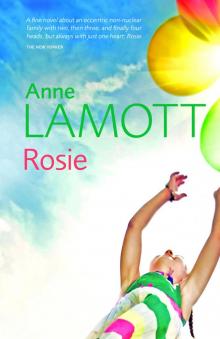 Rosie
Rosie Crooked Little Heart
Crooked Little Heart Bird by Bird: Some Instructions on Writing and Life
Bird by Bird: Some Instructions on Writing and Life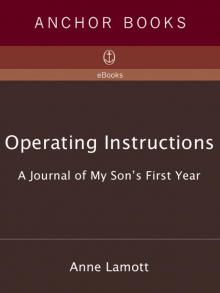 Operating Instructions: A Journal of My Son's First Year
Operating Instructions: A Journal of My Son's First Year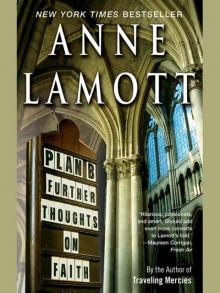 Plan B: Further Thoughts on Faith
Plan B: Further Thoughts on Faith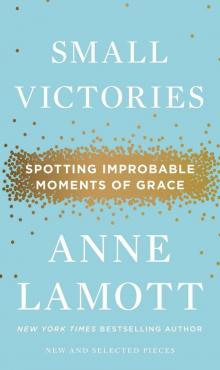 Small Victories: Spotting Improbable Moments of Grace
Small Victories: Spotting Improbable Moments of Grace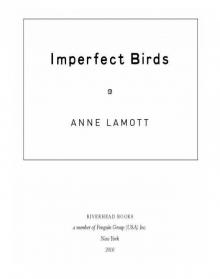 Imperfect Birds
Imperfect Birds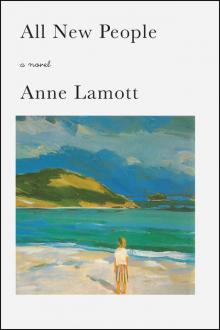 All New People
All New People Grace (Eventually)
Grace (Eventually)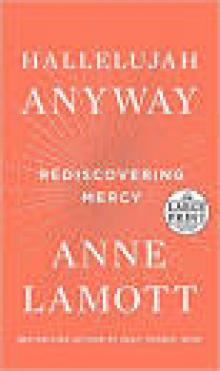 Hallelujah Anyway
Hallelujah Anyway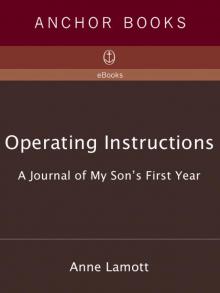 Operating Instructions
Operating Instructions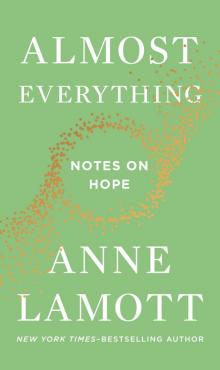 Almost Everything
Almost Everything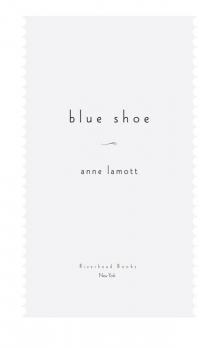 Blue Shoe
Blue Shoe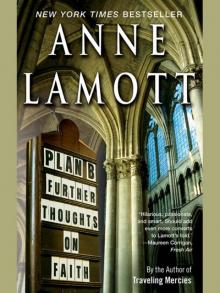 Plan B
Plan B Bird by Bird
Bird by Bird